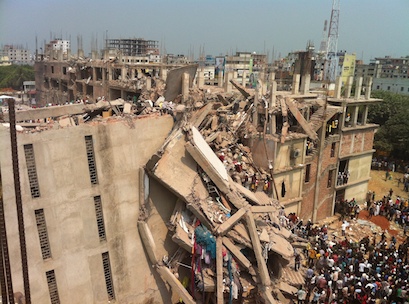Eighteen months on, the impact of the Rana Plaza collapse is still being felt in the community which produces clothes in volume for the world’s fashion retailers.
And many brands who sourced clothing from the four factories in the building have allegedly failed to pay their full contributions to the trust fund set up to aid victims.
Lobby group Clean Clothes Campaign staff have visited the Bangladesh town Savar, scene of the disaster where 1129 workers were crushed to death in the collapse of sweat shops, and met with survivors and families.
They report being “shocked and deeply saddened” by the number of people who are now unable to find work or rebuild their lives.
“Factory owners are turning people who worked in Rana Plaza away as they are deemed too ‘damaged’ and too much of a risk,” says Samantha Maher, of Clean Clothes Campaign, who was in Bangladesh this month. “It is shocking to see how defeated so many of them are, especially when compared with other workers we met.”
The April 13, 2013, collapse has prompted an improvement in working conditions and the adoption by clothing brands of greater responsibility for ensuring employment standards are met by suppliers. The safety measures now being introduced through the Bangladesh Accord on Fire and Safety offer the hope of a better future in the industry, Maher said.
However, for more than 2000 women and men who survived the collapse vital compensation payments have not been as forthcoming. She says the compensation fund is still almost US$20 million short and singled out Italian clothing brand Benetton, which was sourcing from the building, as having to make even an initial payment into the fund.
“The significance of this lack of full payment can be felt most keenly when talking to the young women who were supporting their whole families by working in Rana Plaza. Now alongside the physical and emotional damages suffered on that fateful day they have the added burden of no financial security.
“Women like 18 year old Mahinu Akter, who just two days before the collapse of Rana Plaza, became the sole earner in her family when her father was killed in a bus accident. Mahinu, had been working in a factory at Rana Plaza since she was 14, to help support her mother and two brothers.
“Mahinu sustained head injuries and lost a toe in the collapse. She spent 20 days in hospital,” the campaign reports.
“Once she was released she was in bed for a month and couldn’t eat. Even now she struggles to eat and has lost her appetite. She still also suffers from pains in her feet, swollen legs, memory loss and constant headaches.”
The campaign says the fact the Rana Plaza Donor Trust Fund has only been able to provide 40 per cent of the compensation payments due to Mahinu and others like her – due to big brands not paying what they owe – means the families are unable to make long term plans.
“In many cases the fact that full compensation cannot be made is having a serious impact on the usefulness of these payments. Receiving money in small amounts means that for people already living in dire financial straits they have no choice but to use it for daily life, instead of saving it or investing in a new business or land to ensure they will manage in the long run,” added Maher.
Mahinu received some business training whilst she was in hospital from the Centre of Rehabilitation of the Paralysed and 7000 taka (US$90) to buy stock for a small shop, but to be able to start this she had to take a small loan out to buy a fridge and set up the shop.
“Whilst it has enabled her to earn some money for the family, it is clear that charitable support is not a substitution for the full and fair compensation she and the other survivors are entitled to.”






